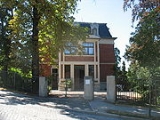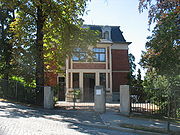
Nietzsche-Archiv
Encyclopedia

Friedrich Nietzsche
Friedrich Wilhelm Nietzsche was a 19th-century German philosopher, poet, composer and classical philologist...
.
The Nietzsche Archive was founded in 1894 in Naumburg, Germany
Naumburg
Naumburg is a town in Germany, on the Saale River. It is in the district Burgenlandkreis in the Bundesland of Saxony-Anhalt. It is approximately southwest of Leipzig, south-southwest of Halle, and north-northeast of Jena....
, and found a permanent location at Weimar
Weimar
Weimar is a city in Germany famous for its cultural heritage. It is located in the federal state of Thuringia , north of the Thüringer Wald, east of Erfurt, and southwest of Halle and Leipzig. Its current population is approximately 65,000. The oldest record of the city dates from the year 899...
. Its history until the middle of the 20th century was closely tied to its founder and chief for many years, Elisabeth Förster-Nietzsche
Elisabeth Förster-Nietzsche
Therese Elisabeth Alexandra Förster-Nietzsche , who went by her second name, was the sister of philosopher Friedrich Nietzsche and the creator of the Nietzsche Archive in 1894....
, the philosopher's sister. Though from its inception the archive came under much criticism for doctoring, or even forging, documents to support certain ideological purposes, the Archive was, until the end of the Second World War, a location of central importance for Nietzsche's reception in Germany. In the GDR it was affiliated with the Nationale Forschungs- und Gedenkstätten der klassischen deutschen Literatur in Weimar (National Research and Memorial Sites of Classical German Literature in Weimar), and formally dissolved in 1956. Its holdings were made accessible for western researchers, most notably Mazzino Montinari
Mazzino Montinari
Mazzino Montinari was an Italian scholar of Germanistics. A native of Lucca, he became regarded as one of the most distinguished researchers on Friedrich Nietzsche, and harshly criticized the edition of The Will to Power, which he regarded as a forgery, in his book The will to power does not...
, who replaced the dubious old Archiv's Nietzsche editions with new ones. In the GDR, however, Nietzsche was still a forbidden author, with all of his works being banned.
Since German reunification
German reunification
German reunification was the process in 1990 in which the German Democratic Republic joined the Federal Republic of Germany , and when Berlin reunited into a single city, as provided by its then Grundgesetz constitution Article 23. The start of this process is commonly referred by Germans as die...
, the archive's holdings are in possession of the Stiftung Weimarer Klassik, now called Klassik Stiftung Weimar. The archive's domicile, the Villa Silberblick, is now a museum.
Objectives
Elisabeth Förster planned the establishment of a Nietzsche Archive after returning to Germany from Paraguay in the Fall of 1893. The purpose of the archive was to collect resources to keep them from being scattered and to secure a monopoly over their value—not unusual at that time.From the beginning of the 1890s, the reception of Nietzsche's works in the German-speaking world grew enormously. The Nietzsche Archive attempted to attain the legal rights of interpretation of Friedrich Nietzsche and his philosophies in public discussions. Not only did Elisabeth Förster-Nietzsche's biographies serve these discussions, but also a multitude of journals and newspaper articles which came from the archive and the surrounding areas. Förster-Nietzsche had already collected documents from her admired brother since her youth and then began to buy up all of his mail correspondences for a substantial sum. These letters were therefore also published directly and indirectly by the archive alongside Nietzsche's works. Another reason for the publishing frenzy from the archive and its monopolization of Nietzsche's work might also have been to earn large profits from them.

